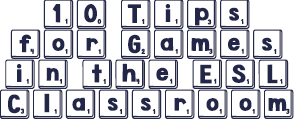10 Tips for Games in the ESL Classroom
Matt Errey1. Find books and e-books of ESL games and become familiar with the type of games in each. This will make it easier to find the right game for a particular lesson.
2. When choosing games for a class, check that they’re for the right age group, the right level of proficiency, the right number of students and they’ll take up a suitable length of time. Books and e-books of ESL games should provide all these details for each game.
3. Occasionally games can be used to fill in time or provide a break from the usual class routines. But most of the time games should have a function within a lesson plan. For example, they can be used at the start of a lesson to introduce material or they can be used towards the end of a lesson to test, reinforce or practise the language elements or skills presented.
4. Choose games with simple rules and clear instructions. You shouldn’t have to waste valuable classroom time explaining complicated rules or giving complex instructions. After explaining how a game works, ask if anyone has any questions.
5. In classes for adults and young adults, you might need to briefly explain the purpose of the game in terms of the material covered in the lesson. Some older learners will think games are only for children, and explaining their function can help these learners see games as a valid and useful activity.
6. For younger learners up to the ages of 10 or 11, games that involve some physical movement often work best. When children are enjoying themselves and having fun, they often feel excited and full of energy. If they’re forced to stay still, they can become restless and even disruptive.
7. Don’t put too much emphasis on winning a game by awarding prizes or titles like “class champion”. The emphasis should be on having fun and learning. If the emphasis is on winning, negative feelings like disappointment, shame, envy or blame can spoil the atmosphere.
8. If a game involves quiz questions or information exchanges, try to use topics that interest your students. These can be topics like music, movies, sports, local news, etc. This will help to make the game more interesting and help your students to stay focused.
9. If you have many students and you’d like them to play a game that works best with just a few players, have them form small groups. Then explain the game while modelling it with one group while the others look on. When everyone understands how it works, the other groups can begin playing. This is better than having one group play while all the other students watch and wait for their turn to play.
10. Start a “Games Diary” in which you keep notes on each game you use in your classes. You can note how difficult or easy it was to explain, whether your students enjoyed it or not, and how well it performed its function. After using a game, you can even ask your students questions like “Was it fun?”, “Did it help you to learn?”, “Could it be improved?” and record their answers in your diary as well.
12 comments
-
Mohammed BADIOUI says:
I really do appreciate Englishclub . Your lessons are of great help to me and undoubtedly to any English learner seeking deep language knowledge . Your vivid and interactive methods inspire me and make you number 1 on my list of English learning resources. So keep it up and happy new year with all the best wishes.
Yours faithfully, Mohammed BADIOUI -
Teacher Edward Kunda Matanda says:
Very important tips to make The learning live and interesting.
-
I would appreciate if I received a copy of the Matt'sESL Games and quizes e.book says:
The 10 top tips are very vital in an active ESL classroom both for the learners and the teacher.
-
I would appreciate if I received a copy of the Matt'sESL Games and quizes e.book says:
The 10 top tips are very vital in an active ESL classroom both for the learners and the teacher.
Please if you availed some copies, I would appreciate.
Thanks
-
Asif says:
Hello
-
who born dog? says:
full bueno the article. it helped me a lot!¡
-
Mateus Domingos says:
That is a good article I really liked it.
-
Akku says:
Hi! Very good ideas. I like it 😘
-
Gamieh says:
Thanks a lot it’s really helpful
-
Teacher Helen says:
Excellent article! I Love English Club!
-
habibullah says:
i want to learn prfitional english
-
Daniel says:
Great article and some really useful tips there. For point 7 I have to say that I’ve had great results when adding in prizes and competition to the classroom and had really positive experiences. Thanks for the tips! – Daniel – TEFLCareer.com
 1. Find books and e-books of ESL games and become familiar with the type of games in each. This will make it easier to find the right game for a particular lesson.
1. Find books and e-books of ESL games and become familiar with the type of games in each. This will make it easier to find the right game for a particular lesson.